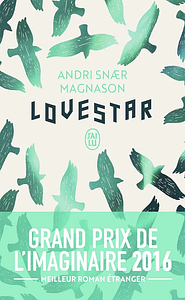You need to sign in or sign up before continuing.
Take a photo of a barcode or cover
An easy but enchanting read — definitely felt the influences of 1984 + Hitchhikers Guide to the Galaxy, while still remaining fresh and interesting. I’m continuously fascinated by Icelandic literature, and glad I picked this one up.
Points positifs :
- Concept hyper cool, réfléchi et intelligent d'un monde dystopique où l'humain est sans fil et rembombinable, la mort est esthétique, l'amour est calculé
- : mène à des questionnements sur le bonheur, la liberté, le pouvoir, le capitalisme,
l'environnement...
- C'est un roman qui fait RÉFLÉCHIR
Points négatifs :
- Éléments vraiment randoms : les mickeymouses tueurs, le grand méchant loup, la fin du monde
- ça m'a vraiment fait décrocher
- j'ai fait des recherches parce que je pense que je n'ai pas compris le symbolisme de ces
éléments et ce que j'ai trouvé ne m'aide pas nécessairement à comprendre : roman lyrique,
ironique, entre science-fiction et comédie romantique inversée
- La ligne du temps est assez floue (concept d'éllipse : omission d'une suite logique)
- Concept hyper cool, réfléchi et intelligent d'un monde dystopique où l'humain est sans fil et rembombinable, la mort est esthétique, l'amour est calculé
- : mène à des questionnements sur le bonheur, la liberté, le pouvoir, le capitalisme,
l'environnement...
- C'est un roman qui fait RÉFLÉCHIR
Points négatifs :
- Éléments vraiment randoms : les mickeymouses tueurs, le grand méchant loup, la fin du monde
- ça m'a vraiment fait décrocher
- j'ai fait des recherches parce que je pense que je n'ai pas compris le symbolisme de ces
éléments et ce que j'ai trouvé ne m'aide pas nécessairement à comprendre : roman lyrique,
ironique, entre science-fiction et comédie romantique inversée
- La ligne du temps est assez floue (concept d'éllipse : omission d'une suite logique)
Bienvenue dans un monde futuriste et ultramoderne, où tout est connu et rien n’est laissé au destin. Le contrôle est total, tant sur les actions que sur les sentiments; la liberté de décision n’existe plus et n’est plus souhaitée. Dans ce qui est décrit comme le meilleur des mondes, ou presque, certaines exceptions à la règle existent; des individus qui ne se conforment pas suffisamment et qui, sans trop le savoir, et peut-être sans le vouloir pleinement, commencent à remettre en question le système, menaçant sa stabilité illusoire. On assiste alors au développement d’une histoire d’amour dystopique, pleine de rebondissements, avec des pointes d’humour et de tendresse. Le récit est superbement rendu par la traduction française publiée chez Alto, qui nous donne envie de lire davantage de fictions islandaises!
adventurous
mysterious
medium-paced
Plot or Character Driven:
A mix
Strong character development:
Complicated
Loveable characters:
Complicated
Diverse cast of characters:
N/A
Flaws of characters a main focus:
Complicated
I actually really liked the premise and the style was intriguing.
Indridi and Sigrid are the equivalents of Icelandic science fiction millennials. Living in a cordless and wireless world where data is transmitted via birdwaves, their entires lives are now premeditated. They are in love but tragically not paired together. Can love overcome social engineering?
Get the full review on my blog, The Uncorked Librarian: https://theuncorkedlibrarian.com/icelandic-novels/
Get the full review on my blog, The Uncorked Librarian: https://theuncorkedlibrarian.com/icelandic-novels/
--FOR SCI-FI BOOK CLUB--
First, a caveat: I listened to this one and I suspect my listening experience strongly informed my attitude about the book. I have very little love for the narration of the audiobook. It was stilted and affected and, frankly, irritating. The narrator performed any female voice in a screechy howl, and one particular passage (if you've read it, it was Per's repetitive diary entry -- you know the one) made me willing to commit terrible acts if it'd bring about the end more quickly. Please, if you want to read this book, actually read it and don't listen. Trust me.
LoveStar (the book) is generally about a Steve Jobs like ideas-man (also named LoveStar) who comes up with wild notions (like pulling together a bunch of dead satellites to make the brightest body in the heavens, also named...LoveStar) and gets his minions to pursue them while he moves on to the next brainstorm. His ideas have led to a world of people reliant on technology in unpredictable ways. His ideas have led to things that might seem beautiful (LoveDeath, for instance, involves bodies shot into the atmosphere, which burn up and look like falling stars) but are ultimately disastrous and serve to divorce individuals from their own humanity (this "beautiful death" is expensive and wasteful, and allows citizens to disassociate from the reality of the end of life). His ideas have led to disaster that no one is willing to admit is disaster. The plot is also focused on two young people in love, a simple enough notion complicated by the governmental organization iLove, which matches humans across the globe with their ideal other halves.
I absolutely adored a lot of the near-future ideas in LoveStar (originally published in Icelandic in 2002, translated into English in 2012). The advertising concepts (people can hire themselves out as Howlers and bark advertisements to passersby on behalf of companies), social constructs (for a time, children can be discarded and a clone born in its place in order to raise a better product if the first attempt proved disastrous), and take on globalism (war and racism would become obsolete if people were love-matched with people form different parts of the world, thus removing the notion of us-vs.-them) were really interesting and fun. The problem for me is that I didn't care about the main plot at all and was left with little payoff at the end. The fairy-tale conclusion (in a sort of Grimms way, not a Disney way) felt rushed and too easy. Comparisons are made to Kurt Vonnegut and I didn't find that comparison particularly apt. (This may be because I adore Kurt Vonnegut.)
First, a caveat: I listened to this one and I suspect my listening experience strongly informed my attitude about the book. I have very little love for the narration of the audiobook. It was stilted and affected and, frankly, irritating. The narrator performed any female voice in a screechy howl, and one particular passage (if you've read it, it was Per's repetitive diary entry -- you know the one) made me willing to commit terrible acts if it'd bring about the end more quickly. Please, if you want to read this book, actually read it and don't listen. Trust me.
LoveStar (the book) is generally about a Steve Jobs like ideas-man (also named LoveStar) who comes up with wild notions (like pulling together a bunch of dead satellites to make the brightest body in the heavens, also named...LoveStar) and gets his minions to pursue them while he moves on to the next brainstorm. His ideas have led to a world of people reliant on technology in unpredictable ways. His ideas have led to things that might seem beautiful (LoveDeath, for instance, involves bodies shot into the atmosphere, which burn up and look like falling stars) but are ultimately disastrous and serve to divorce individuals from their own humanity (this "beautiful death" is expensive and wasteful, and allows citizens to disassociate from the reality of the end of life). His ideas have led to disaster that no one is willing to admit is disaster. The plot is also focused on two young people in love, a simple enough notion complicated by the governmental organization iLove, which matches humans across the globe with their ideal other halves.
I absolutely adored a lot of the near-future ideas in LoveStar (originally published in Icelandic in 2002, translated into English in 2012). The advertising concepts (people can hire themselves out as Howlers and bark advertisements to passersby on behalf of companies), social constructs (for a time, children can be discarded and a clone born in its place in order to raise a better product if the first attempt proved disastrous), and take on globalism (war and racism would become obsolete if people were love-matched with people form different parts of the world, thus removing the notion of us-vs.-them) were really interesting and fun. The problem for me is that I didn't care about the main plot at all and was left with little payoff at the end. The fairy-tale conclusion (in a sort of Grimms way, not a Disney way) felt rushed and too easy. Comparisons are made to Kurt Vonnegut and I didn't find that comparison particularly apt. (This may be because I adore Kurt Vonnegut.)
It is rare to encounter such pure and awesome wackiness.







